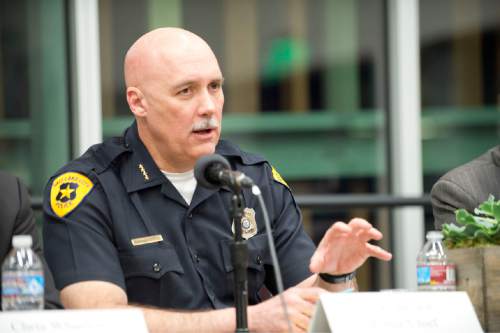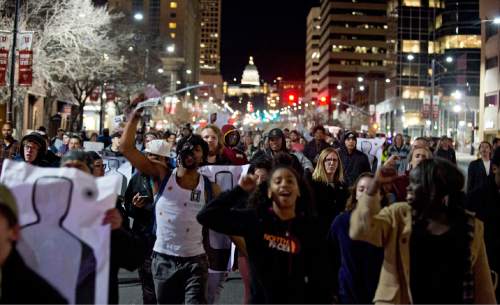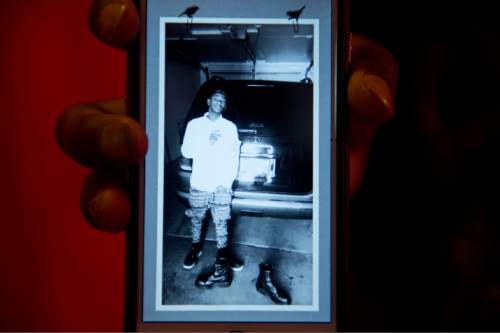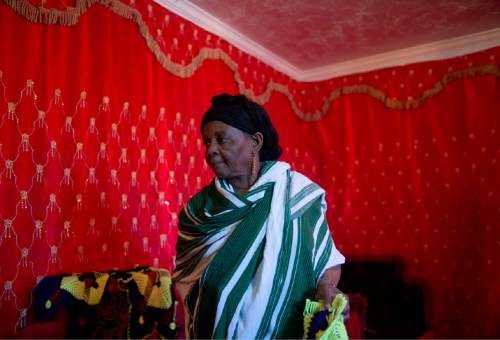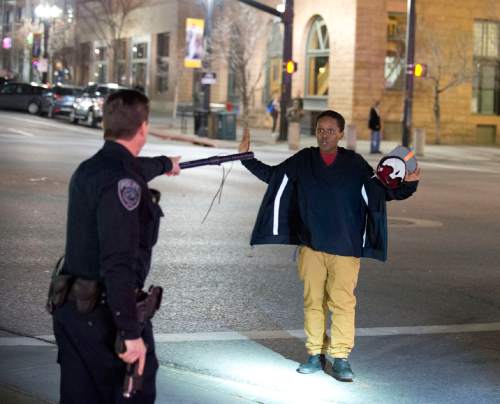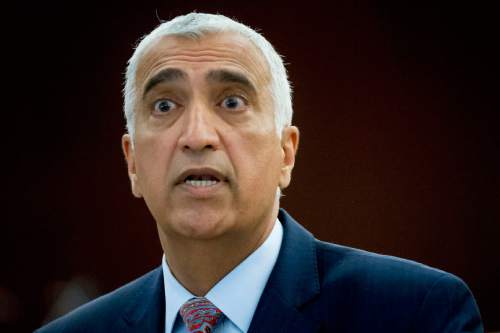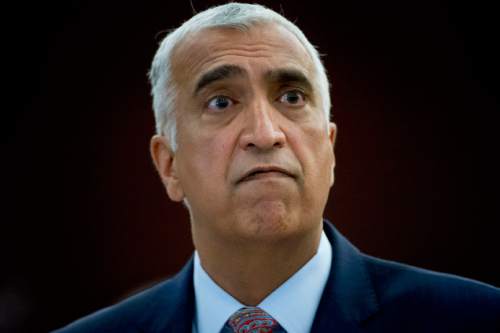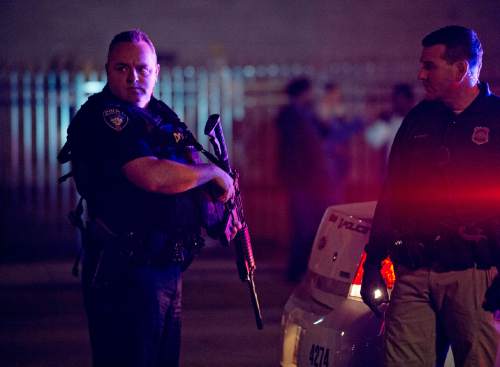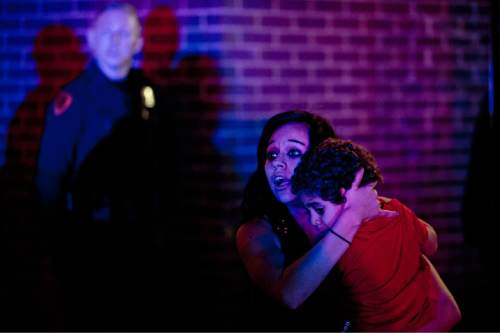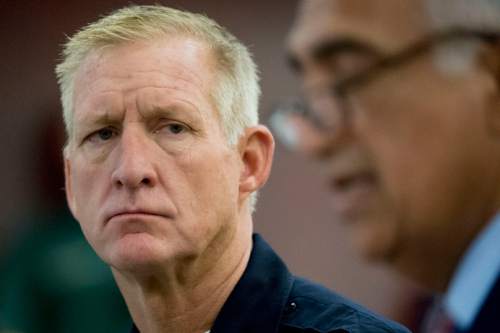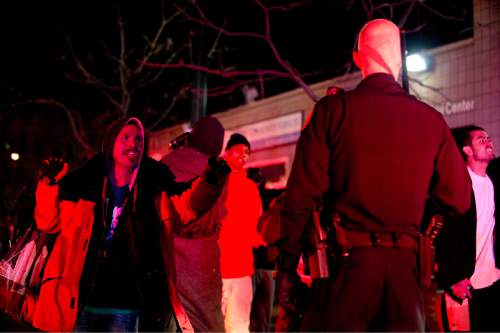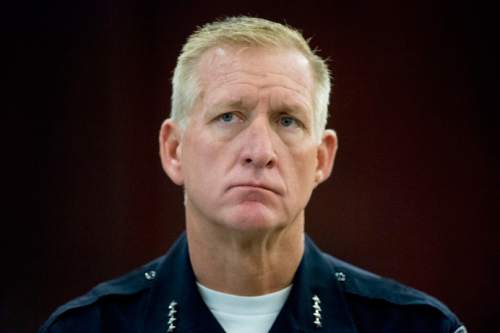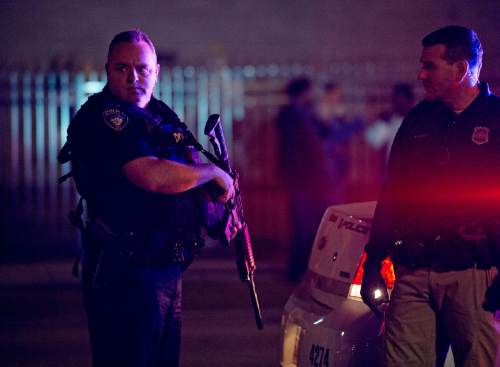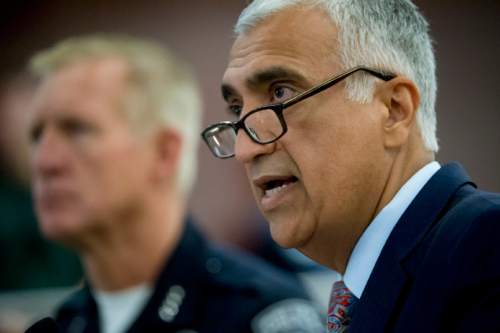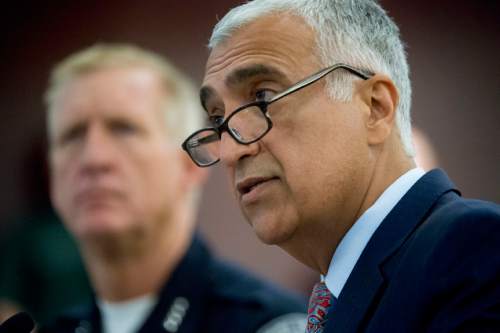This is an archived article that was published on sltrib.com in 2016, and information in the article may be outdated. It is provided only for personal research purposes and may not be reprinted.
Two Salt Lake City police officers who stopped an alleged assault outside a downtown homeless shelter when they shot and critically wounded a 17-year-old were justified in firing their weapons, Salt Lake County's chief prosecutor announced Monday.
No criminal charges will be filed against the two officers, District Attorney Sim Gill said, though the teen boy who was struck by four police bullets Feb. 27 now faces felony counts in the alleged assault.
Somali refugee Abdullahi "Abdi" Mohamed survived the shooting. He was initially put into a medically induced coma and hospitalized for weeks.
Gill said the teen was selling drugs at the shelter and that the assault stemmed from a dispute about a drug purchase.
"[The alleged assaulted victim] believed the officers saved his life," Gill said.
Mohamed was charged Monday in 3rd District Juvenile Court with aggravated robbery, a first-degree felony, and drug possession with intent to distribute, a second-degree felony. A warrant was issued for his arrest, court records show, and a hearing is set for Wednesday.
Prosecutors will seek to move the case to adult court, Gill said. If convicted in the adult system, Mohamed could face up to life in prison on the robbery charge.
Mohamed, who turned 18 in April, was at his Salt Lake City home in a wheelchair Monday and seemed unaware of the criminal charges. The teen denied the assertion that he had assaulted the victim over drugs.
"I wasn't doing none of that," Mohamed said.
He referred any other questions to his attorneys, who did not return calls for comment.
—
Conflicting accounts • Differing accounts from witnesses, police and Mohamed's family have swirled since the shooting. On Monday, Gill's office offered its official view in a 24-page document that details the results of a nearly six-month investigation.
According to the document, Officers Kory Checketts and Jordan Winegar were called to The Road Home shelter, 210 S. Rio Grande St., to investigate a report of a stolen cellphone. As the two left the building, they spotted Mohamed and two others involved in a confrontation.
A man approached Mohamed outside the shelter, court papers say, looking to buy a marijuana cigarette for $1.10. Mohamed told the man, identified as K.M. in the district attorney's report, that he had only methamphetamine, and insisted that K.M. should turn over his money so Mohamed could find him a joint.
K.M. refused, according to court records, and instead offered Mohamed a metal rake handle that he had found in the trash.
This made Mohamed "really mad," K.M. told police, and the teen began hitting him with the rake handle. A second man wielding a metal pipe joined in the assault.
When officers spotted the fight, they ordered the two to drop the weapons. The man with the pipe complied and fled, according to Gill's report, but Mohamed did not obey their commands.
Checketts later told investigators he thought the suspects were carrying swords or pipes, and that the officer drew his gun because he believed Mohamed could inflict death or serious bodily injury on K.M.
Winegar also told investigators it appeared Mohamed was intent on going after K.M. and that there "was nothing stopping him." The victim appeared helpless as he backed away from his assailant, Winegar said.
Body-camera footage recorded the police yelling, "Put it down," "Drop it," "Police" multiple times before shots were fired, according to Gill.
Mohamed continued to advance on K.M. with a "slow, methodical rage, and he's like, on a mission," Winegar told investigators. Believing that Mohamed could kill the alleged victim, Winegar said there was "only one thing [he] could do to stop the threat," and that was to shoot the suspect, the report said.
Mohamed's friend Selam Mohammad, however, told a different story to The Salt Lake Tribune shortly after the shooting.
She said Mohamed was in a confrontation with a man over comments made about her, and they were each holding part of a broomstick when officers ran up.
"They told him to put it down, once," Mohammad said, and "started shooting him as soon as he turned around." Mohammad said the police fired four times and that her friend was hit in the chest and stomach.
In May, Mohamed told KUTV that a man asked him for drugs and became angry when Mohamed's friends said they didn't have any. Mohamed grabbed a broomstick for protection, he said, after the man pulled out a knife and said, "I'm going to stab you."
The Tribune does not generally identify juveniles charged with a crime, but Mohamed's family publicly identified him in the wake of the police shooting.
—
Public response • The shooting sparked an immediate outcry from people gathered near the shelter, who shouted and threw rocks and bottles at the police. The fervor continued in the ensuing months, with protests, demands for the release of body-cam footage, and calls for better dialogue between police and the public.
Mohamed's family and the American Civil Liberties Union of Utah have also asked that the footage be released, but Gill's office has denied the requests, citing an ongoing investigation.
Gill refused again Monday, saying the footage and surveillance video are now evidence in Mohamed's criminal case.
A determination about the legality of the shooting took months, Gill said, partly because his office was juggling six simultaneous officer-involved shooting reviews. Public interest in the case also underscored the need for a thorough investigation, he said.
"My job is to take the facts, apply them to the construct of the law and reach a conclusion," he said. "If it's about taking sides, to half of the population, I'll be a genius. To the other half of the population, I'll be a cad. It's not about trying to make a popular decision. It's about committing yourself to the process that is objective, that is fair, that is accountable, and call it like you see it."
In response to Gill's ruling, the group Utah Against Police Brutality announced plans for an "emergency rally" Tuesday evening at the Salt Lake County Government Center.
Salt Lake City Police Chief Mike Brown said Monday in a statement that he hopes to continue having an open dialogue with the community and thanked the public for "patience, understanding and trust in this process."
"We understand that as these conversations occur, that this is a journey, and not a destination," he said. "It is only through continuing to have these tough conversations and being open and transparent that we will be able to strengthen the trust within the communities that we serve."
Changes have already been made since Mohamed was shot, including increased de-escalation training and changes to the Civilian Review Board, first-year Mayor Jackie Biskupski said.
A policy addressing when police body-cam footage and other information should be released is also in the works, she said.
"Though some may wish to drag us into prescribed corners, or to draw lines between us, I have seen firsthand over the last few months that the majority of people in Salt Lake City, including our law enforcement, are not willing to go that route," Biskupski said in a statement. "... It is critical we remember we are in this together."
Twitter: @jm_miller
— Tribune reporters Pamela Manson, Christopher Smart and Bob Mims contributed to this report


